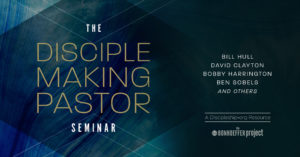3 Keys to Help Introverts Become Excellent Disciple Makers
Disciple making is simultaneously easy and difficult. Like learning to play the piano, a person can play notes as soon as they sit down, but that same person could spend a lifetime developing their skill without perfecting it. While many people play the piano, some well, some not so well, most quickly decide it’s not for them.
The same is true of disciple making. As the profile of disciple making continues to rise in Western Christianity, many many people are discipling others, but even more have decided it’s not for them.
Once you understand what’s required to become a disciple maker it’s easy to think you’re not qualified. Again, it’s not that people think it’s hard to start, they think it’s hard to succeed. And to some degree, they’re right. The disciple making scale shows us that making disciples requires a person to be both relational and intentional. Since few people fall in the middle of the scale, it requires everyone to intentionally grow towards the center.
One way to quickly sort potential disciple makers is by personality. Extroverts are normally more relational while introverts are normally more intentional. Today I want to focus on the challenge that introverts (“intentionals”) have in making disciples and three key steps they need to take in order to become a fruitful and lasting disciple maker.
If you’re an extrovert don’t tune out! You likely know an introvert who could use your help or perhaps you’re discipling an introvert. Understanding what follows could make all the difference as you influence them.
Before jumping in I want to acknowledge the reality that not all introverts are intentional and not all extroverts are relational, but by and large the truth holds.
Introverts are often on the intentional side of the scale because their attention is inwardly focused. They go through life reflecting on experiences, rather than seeking them. Their inward focus leads to a rich inner life that leads to deep insight and personal nourishment. High stimulus environments make it difficult to hear the inner voice and thus drain introverts.
Contrary to popular belief, being an introvert doesn’t mean someone is socially inept or dislikes people. Relationships are actually very important to them, but they prefer just a few deep friendships, rather than many that are less deep.
It’s hard being an introvert in America. Our culture is oriented around extroverts. The church is no different. Worship services, retreats, service opportunities, and small groups, are all extrovert centric. As a result, when an introvert hears about the relational nature of disciple making, they often interpret as being just another thing that’s geared toward extroverts.
I know because I am an introvert and naturally very intentional. My path to becoming a fruitful disciple maker has demanded a lot of me. Over the past twenty years, I’ve worked hard to become more relational and over the last ten I’ve helped many others in the same journey. I’ve learned that there are three keys to becoming more relational… or to helping someone else become more relational.
1. Cultivating Awareness
Most highly intentional people aren’t aware of their relational deficits. Instead, they’re attuned to accomplishing goals or to defending a truth or belief they hold. Since introverts are inwardly focused they can often miss the impact they are having on others. I’ve often been surprised by someone’s offense or dislike of me. Growing towards the relational side of the scale has required me to develop awareness of how other people experience me.
Practically, I have grown in this by talking to trusted relational friends. I ask them what they’re seeing in me and how to handle situations where I feel lost. Another thing I’ve done is to read books that focus on emotional and relational health. As I was starting this process, I read this book every month for a couple years. It helped me develop awareness of whether I was doing what was already intellectually known to me.
Justin Gravitt, author of this blog, is with Navigator’s Church Ministries. They have made available to you, “The Start Small Grow Slow Strategy,” which you can download for free here.
2. Conquering the Authenticity Problem
Understanding what changes need to be made leads most to an authenticity problem. In American culture, relational skills often feel fake to strong intentionals. Many may say something like, “So, when I meet someone, I’m supposed to smile and chit chat with them? And after exchanging cliched information for five minutes, I’m supposed to smile again and tell them it was good talking to them?! That sounds terrible and it wouldn’t be true!” See the problem?
Overcoming this isn’t easy. There is a period of practice that feels like lying, but it’s not. Intentionals can conquer this problem by understanding there is more than one truth and seeking the deeper truth. Just as mobile home is both a mode of transportation and a dwelling, the same experience can have multiple truths.
The setting here is normally social interaction. Intentionals often experience social settings as an exercise in ritualized lying. If a person is trying to become more relational they could also process the interaction as an opportunity to grow. We can smile at the opportunity and say it was good talking to them because we need such interactions to become who God is calling us to become. With practice, the interactions feel more and more natural, even if they never become enjoyable.
3. Committing to Consistent Action
Without consistent action awareness and a path to authenticity won’t matter. But since intentionals excel at making and carrying out plans, committing to consistent action is normally their easiest of these steps.
The actions needed are always relational. Examples include initiating conversation with someone at church, inviting someone out to lunch, or just calling a friend to talk when they’d rather read a book. It’s not everything at once, but it’s one thing as often as possible. Since introverts are internally attuned they are well aware of balancing when to push into action and when it’s been enough for the day.
Consistent action over time breeds more capacity for action, and before you know it, real growth.
Though I haven’t included it in these three steps, these steps should be bathed in prayer and protected by allowing a trusted friend to encourage you as you go.
After twenty years, I’m still intentionally working to grow relationally. Some days are easier than others, but I’ve seen a lot of growth. If you’re an introvert, I want to clearly tell you that disciple making isn’t out of your reach and it’s not easier for extroverts. Those who are naturally intentional excel in aspects of disciple making that extroverts marvel at (and vice versa), so don’t sideline yourself when it comes to disciple making. Instead embrace God’s call on your life to make disciples and begin intentionally becoming more relational!
There’s one more thing, I want to share and hope you’ll join me.
I’ve stopped apologizing for being an introvert. Though our culture inundates us with messages that we’re lesser, don’t believe them. I’ve stopped saying things like, I’m “a functioning introvert” or “an introvert who loves people” or the like. We have a lot to offer the world and it’s time we boldly offer them.
Written by Justin Gravitt
Justin Gravitt is the Dayton (Ohio) Area Director for Navigator Church Ministries. Read more from Justin at his blog, “One Disciple to Another,” where this article first appeared.
https://www.justingravitt.com/blog/3keys-introvertdisciplemakers






